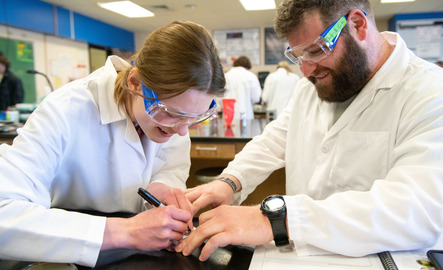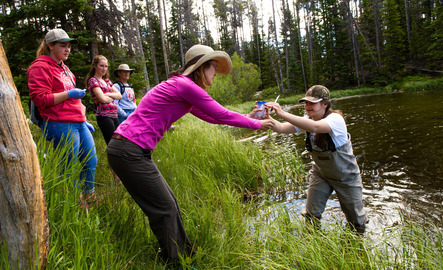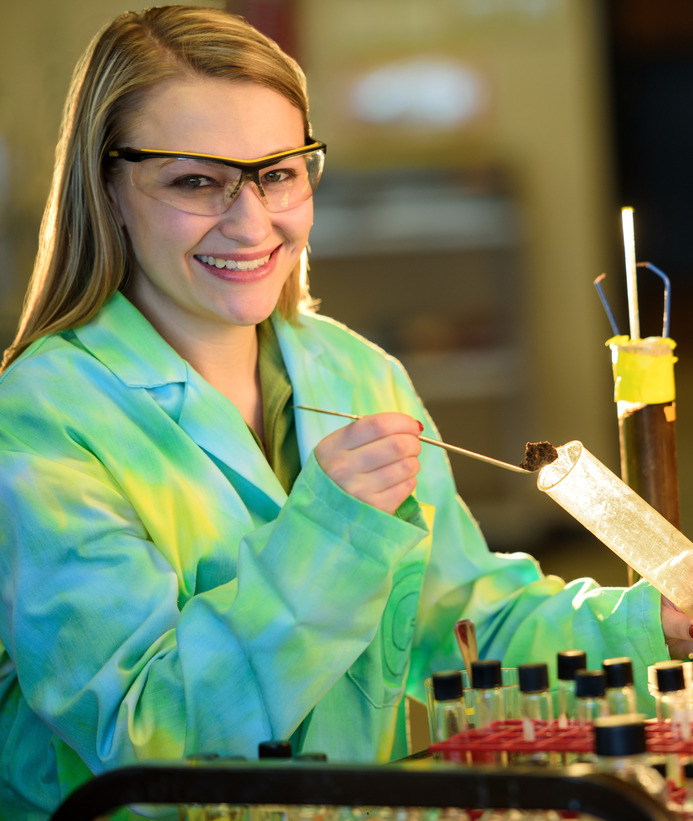What is Microbiology?
Microbiology is a field of study that focuses on the study of microorganisms, including bacteria, viruses, fungi and parasites. Microbiology contributes to our understanding of genetics, diseases and more. UW educates students about basic and applied microbiological sciences throughout our interdepartmental program utilizing a combination of coursework and laboratory experiences. We ask students to examine new problems in the field to prompt growth and curiosity.

At UW, microbiology faculty are top-notch mentors. With expertise in various areas throughout microbiology, they guide students in research, course choices and career paths. Their support creates a supportive environment, empowering students to succeed academically and professionally to become future leaders in microbiology.

What can you do with a microbiology bachelor's degree?
A bachelor’s degree in microbiology prepares you for careers in healthcare, research, industry and environmental science. Graduates often work as lab technicians, biomedical technologists, quality control analysts, or in roles related to infectious disease, food safety or public health. It’s also an excellent foundation for graduate or professional programs in medicine, veterinary science, public health or microbiology research. This degree equips you with valuable lab skills and scientific knowledge that are in high demand across multiple fields.
- Physician
- Postsecondary Teacher
- Physical Scientist
- Biological Scientist
- Veterinarian
- Research Laboratory Technician
- Quality Control Analyst
- Clinical Microbiologist
- Environmental Microbiologist
- Immunologist
- And more!
Here are a few places our University of Wyoming alumni are now working and making a difference:
- Teton County
- Wyoming State Veterinary Lab
- Cheyenne Regional Medical Center
- Purdue University
- Foresight Diagnostics
- Walgreens Pharmacy
- Yale School of Medicine
A microbiologist studies microorganisms such as bacteria, viruses, fungi and algae to understand how they live, grow and interact with their environments. They often work in labs conducting experiments, analyzing samples and developing solutions related to health, agriculture, the environment or industry. Microbiologists may help develop new medicines, improve food safety, track disease outbreaks or research ways to clean up pollution using microbes.
Microbiology can be a challenging degree because it involves a mix of biology, chemistry, math and lab-based coursework. You'll need to understand complex systems at the microscopic level, learn scientific techniques and think critically to analyze data. However, if you’re curious about how life works at a cellular level and enjoy hands-on lab work, many students find it rewarding and engaging. With dedication and interest, it’s a very doable and valuable path.
Microbial Research With Real-World Impact
Join Dr. Linda Van Diepen in this research spotlight as she uncovers the hidden world of soil microbes that sustain Wyoming’s iconic sagebrush ecosystems. As an undergraduate microbiology student at the University of Wyoming, you’ll have the opportunity to explore real-world research like this—both in the lab and out in the field. Supported by Wyoming EPSCoR and the National Science Foundation, this work is part of a broader mission to grow STEM opportunities and research across the state.
"It’s an excellent foundation for those students who aspire to become research scientists or who plan to go on for an advanced professional degree in health care. Our program is unique in that it is interdepartmental and consists of participating faculty with a wide variety of expertise."


